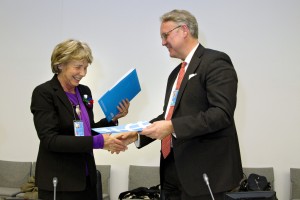UN Women supports the Council of Europe’s Convention against Domestic Violence
Date:
At a Roundtable yesterday , the Deputy Executive Director of UN Women John Hendra reinforced the support of UN Women for what he called the landmark Convention on Preventing and Combating Violence against Women and Domestic Violence, which was adopted by the Council of Europe last year, by signing a letter of intent on future cooperation between the two entities. The event took place on the opening day of the 56th Commission on the Status of Women (CSW).
The Convention's adoption has come at a time of historical political momentum on the issue, and builds on various inter-governmental agreements to vigorously combat violence against women - many made at previous sessions of the Commission on the Status of Women. For the Convention to come into force ten countries have to ratify it; so far been signed by 18 member states and ratified by one, Turkey.
Mr. Hendra especially praised the Convention's emphasis on two priority areas, which reflects the strategic focus of UN Women: prevention; and ensuring full access to critical services for women and girls who have suffered violence.

“Access to critical services is one major challenge, he said. “Even in wealthier countries, services such as hotlines, shelters, police protection, health care and post-rape care, crisis counseling and legal and social assistance, are not easily available or accessible, especially for those who are excluded and `hard-to-reach' - such as migrant and adolescent women, women living with disabilities, women living with HIV, or those living in remote or rural areas. He noted that, according to a recent UN Women scan of 50 National Action Plans on Violence Against Women, very few of them contained express commitments to expand services towards universal access; very few had specific targets and benchmarks for service delivery; and specific packages of services for survivors were not always apparent. They also rarely have budgets attached.
Also at the Roundtable were Ms. A?kin Asan, the Turkish Deputy Minister of Family and Social Policies, who outlined the ways in which her country has been translating the Convention's provisions into its laws, to provide victims with practical support and protection. Turkey was the first country to ratify the instrument, which is also known as the Istanbul Convention. Meanwhile, Ms. Feride Acar, a Turkish member of the UN Committee to Eliminate Discrimination Against Women (CEDAW), spoke of the important connections between VAW and gender inequality, and noted that it is the first legally binding international instrument that explicitly links the two. Ms. Acar participated in the drafting process of the Istanbul Convention on behalf of Turkey.
Speaking from the Council of Europe, Deputy-Secretary-General Ms. Maud de Boer-Buquicchio, who attended with the President of its Parliamentary Assembly, Mr. Jean-Claude Mignon, emphasized that gender-related attitudes and stereotypes must change in order for VAW to be effectively combated, and that cultural justifications for inequality could not be accepted. Referring to domestic violence, and of the home often being a “theatre of violence, Ms. de Boer-Buquicchio highlighted that the issue is now widely understood as a public concern - and a comprehensively mapped state obligation. Ms. Acar also observed that the Convention is a progressive and potentially effective legal tool, and has maintained some flexibility, which makes it suitable for use far beyond Europe's borders.
Mr. Mignon took the opportunity to welcome the support of UN Women and its Executive Director Michelle Bachelet, who, he said, had actively contributed to the promotion of the Convention throughout the world.